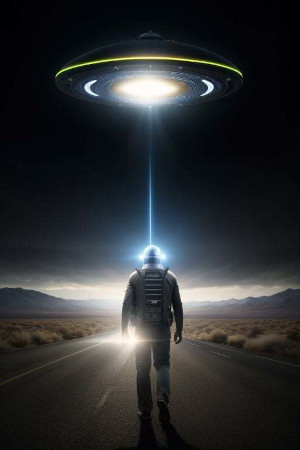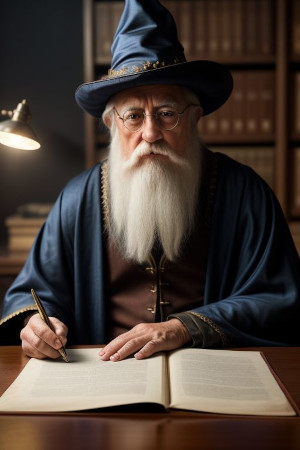2012
May
16
On Harlan Ellison and the Plagiarism of Ideas
Marta:
Shall I compare thee to a summer's day?Thou art more lovely and more temperate.
Rough winds do shake the darling buds of May,
And summer's lease....
Garth:
"You wrote that?"
Marta:
"Yesterday, as a matter of fact."
Garth:
"It was written by an Earth man named Shakespeare a long time ago!"
Marta:
"Which does not alter the fact that I wrote it again yesterday!"
Any science fiction fan as old as I am will recognize this famous interaction from the Star Trek episode, "Whom Gods Destroy." By quoting Shakespeare and claiming to have written it herself, Marta, though insane, is clearly committing plagiarism. However, Mirriam-Webster defines plagiarism as "to steal and pass off (the ideas or words of another) as one's own : use (another's production) without crediting the source," a definition in agreement with most others.
It's the notion of stealing ideas that frightens me.
 I got to thinking about this subject from a thread about Harlan Ellison that appeared in the SFF Chronicles forum. The thread was about something unrelated, but it reminded me that Ellison had sued James Cameron over the production of Terminator, claiming that he stole the idea from Ellison's The Outer Limits episode "Soldier." Now please understand that I am a big fan of the original The Outer Limits series; I consider it still to be the best science fiction anthology ever to be televised. I can describe any episode, and identify any of them before the teaser is over. I can tell you off the top of my head that the episode, "The Human Factor," starred Gary Merrill, Sally Kellerman, and Harry Guardino. With that in mind, when I first watched Terminator -- heck with that, every time I watched Terminator -- I made absolutely no association with "Soldier." Even after knowing about the law suit, I still have trouble connecting the two.
I got to thinking about this subject from a thread about Harlan Ellison that appeared in the SFF Chronicles forum. The thread was about something unrelated, but it reminded me that Ellison had sued James Cameron over the production of Terminator, claiming that he stole the idea from Ellison's The Outer Limits episode "Soldier." Now please understand that I am a big fan of the original The Outer Limits series; I consider it still to be the best science fiction anthology ever to be televised. I can describe any episode, and identify any of them before the teaser is over. I can tell you off the top of my head that the episode, "The Human Factor," starred Gary Merrill, Sally Kellerman, and Harry Guardino. With that in mind, when I first watched Terminator -- heck with that, every time I watched Terminator -- I made absolutely no association with "Soldier." Even after knowing about the law suit, I still have trouble connecting the two.
It seems to be universally agreed that, yes, Cameron was guilty. And that's what scares me. On what basis? The only factors I can find in common between the two productions are that something or somebody came from the future and that there was some fighting involved. In "Soldier," it was a human born and raised for the sole purpose of warfare and in Terminator it was a machine programmed by an artificial intelligence to kill a specific individual. In "Soldier," the time travel was accidental; in Terminator, it was on purpose. More importantly, the themes of the stories are different. "Soldier" is about the psychology of such a person and that the notions of family and love would be totally foreign and potentially unfathomable to him. Terminator was about the intent to change history. The only way I can figure it is that Cameron and the studio agreed to the settlement because it would be more expensive in money and time to endure a law suit. Either way, they did not do a service to literature by creating a silly precedent.
If anything, Universal Soldier might justifiably be considered plagiarism of "Soldier," and Terminator could more likely be considered a plagiarism of Murray Leinster's novel, The Time Tunnel, wherein meddling with past events ended up creating the situation that the time travel was meant to prevent. That Cameron is deemed to have plagiarized Ellison on such flimsy commonality as mere time travel and warfare should raise a red flag to anyone in the business of being creative.
I recall the short story "Moment of Inertia," by Charles Sheffield, published in Analog in 1980. In that story, ship drives had far outpaced a human's ability to withstand the acceleration. To take advantage of that acceleration by real living people, a ship was developed that used a disk of condensed matter that moved closer to the passenger compartment as the ship accelerated, balancing the thrust with the gravitational force of the disk. Unfortunately, at full acceleration, the mechanism jammed, making it impossible to return the disk to its idle position, thereby rendering it impossible to shut off the engines without squashing the crew. They were left accelerating at 50 gees into oblivion.
I thought the notion was brilliant. Unfortunately, it appears that Sheffield (warning: sarcasm to follow) was plagiarizing Jay Williams' Danny Dunn and the Antigravity Paint, because in that book, a relay jammed making it impossible to shut off the antigravity, leaving Danny and his friends to accelerate uncontrollably away from the sun. But wait! Antigravity paint was obviously a plagiarism of cavorite from Wells' First Men in the Moon, which book was a plagiarism of Verne's From the Earth to the Moon, which was a plagiarism of Ludovico Ariosto's "Orlando furioso," which was a plagiarism of the 10th century Japanese folk story, "The Tale of the Bamboo Cutter."
If it sounds as if I'm getting ridiculous here, that's the point. Sheffield didn't plagiarize Williams any more than Cameron plagiarized Ellison. Am I to worry about using warp drive because it would be plagiarizing Star Trek? Is time travel out because Wells already used the principle? (Maybe Ellison was plagiarizing him!) Oh! I can't write about robots because that was Asimov's idea. Or was that Karel Čapek? It all gets so confusing. Oh no! I used elves and dwarves after Tolkien did! Whatever shall I do?
No. We can't own general ideas. Ellison didn't own the idea of a warrior or robot or whatever coming from the future; how that law suit ever got anywhere is beyond my comprehension. Cameron admitted getting his inspiration from, among possible other sources, "Soldier," but -- and read my lips -- that is OK.
To take some else's words and use them, even with some tweaks, is plagiarism. To take someone else's plot, with some tweaks, is plagiarism. If I wrote a horror story about a group of adults who get back together to confront an evil killer clown that terrorized them in their childhood, I suppose Steven King would have a point. But just an evil clown? I don't think so.
By defining plagiarism so broadly that something like time travel can be a premise for a law suit we eliminate most sources of inspiration. Nobody would be able to write a fantasy because Lord of the Rings inspired him. Nobody could write about massive space battles because they might have gotten the idea from "Doc" Smith. And don't even think about time travel, or Ellison might sue you! Indeed, probably 99% of the science fiction and fantasy we enjoy today couldn't have been written at all.
Harlan Ellison is a successful science fiction writer who made significant contributions to the genre. It would be ironic if his idea of plagiarism became the foundation for eliminating it altogether. Or all of literature for that matter.
(Special Treat: In my favorite The Outer Limits episode, "The Inheritors," the gentle Lieutenant Minns was played by Steve Ihnat, who also played the insane Fleet Captain Garth, whose conversation with Marta started this post.)
(Photo copyright Daystar Productions and Villa DiStefano. Used under the fair use provisions of the U.S. copyright law. I Wouldn't want to be accused of plagiarism.)















Comments
by duane on 2012 May 25
Addendum: it seems that Harlan Ellison is at it again: http://www.hollywoodreporter.com/thr-esq/harlan-ellison-sues-claiming-foxs-235987. I hope he he hasn't given up writing altogether to make a living off law suits.
by Jennifer Cthulus on 2012 May 25
By strange coincidence, I just re-watched "Solider" last week. I really like the cigarettes that you light by striking them on the side of the pack, like matches. But the plot of the episode and the plot of "Terminator" could hardly be more dissimilar. You'd expect this sort of thing out of hack writers once in a while, especially with a property as huge as "Terminator" (look at all the Harry Potter "plagerism" suits). But Harlan Ellison is a guy whose legacy is etched in granite! I'm really scratching my head over this one .... Be well, Jennifer.
by duane on 2012 May 28
I had that same thought. Since when does Harlan Ellison have to play games like that? For me, its a smudge of tarnish on an otherwise shining career. Now, not one smudge, but two. As for "Soldier," I like Qarlo's gun. "Leave out half the parts, and it still works." Not sure that quote is accurate.
by duane on 2012 May 25
Addendum: it seems that Harlan Ellison is at it again: http://www.hollywoodreporter.com/thr-esq/harlan-ellison-sues-claiming-foxs-235987. I hope he he hasn't given up writing altogether to make a living off law suits.
by Jennifer Cthulus on 2012 May 25
By strange coincidence, I just re-watched "Solider" last week. I really like the cigarettes that you light by striking them on the side of the pack, like matches. But the plot of the episode and the plot of "Terminator" could hardly be more dissimilar. You'd expect this sort of thing out of hack writers once in a while, especially with a property as huge as "Terminator" (look at all the Harry Potter "plagerism" suits). But Harlan Ellison is a guy whose legacy is etched in granite! I'm really scratching my head over this one .... Be well, Jennifer.
by duane on 2012 May 28
I had that same thought. Since when does Harlan Ellison have to play games like that? For me, its a smudge of tarnish on an otherwise shining career. Now, not one smudge, but two. As for "Soldier," I like Qarlo's gun. "Leave out half the parts, and it still works." Not sure that quote is accurate.
You must be logged in to post a comment.